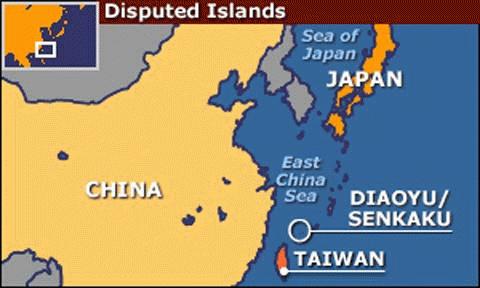Một tàu đánh cá của Trung Quốc hôm 7/9 đã đâm nhau với 2 tàu tuần tra Nhật gần chuỗi đảo tranh chấp giữa hai nước ở vùng biển phía đông Trung Quốc sau khi những cảnh báo liên tiếp từ phía lực lượng bảo vệ bờ biển Nhật.
 |
| Các vụ va chạm giữa tàu cá Trung Quốc và hai tàu tuần tra Nhật xảy ra gần quần đảo Điếu Ngư/Senkaku giữa hai nước. (Ảnh: BBC) |
Theo phát ngôn viên Yosuke Oi của lực lượng bảo vệ bờ biển Nhật, không có ai bị thương vong trong hai vụ va chạm riêng rẽ, xảy ra trong vòng 40 phút. Hai tàu tuần tra của Nhật đã bị tổn hại nhẹ ở phía bên ngoài. Hiện vẫn chưa rõ liệu tàu cá Trung Quốc có bị hư hỏng gì hay không.
Các sự cố xảy ra ở vùng biển thuộc chủ quyền của Nhật, ngoài khơi đảo Kuba, tây nam đất nước mặt trời mọc. Hiện trường va chạm nằm ở phía bắc chuỗi đảo tranh chấp, không có người ở mà phía Trung Quốc gọi là quần đảo Điếu Ngư (Diaoyu) còn Nhật đặt tên là quần đảo Senkaku.
Nằm cách phía đông Đài Loan khoảng 190km, quần đảo này hiện nằm dưới sự kiểm soát của Nhật nhưng Trung Quốc tuyên bố chủ quyền đối với nó.
Theo các quan chức, tàu cá Trung Quốc ban đầu va chạm với tàu tuần tra Yonakuni của Nhật lúc khoảng 10:15 giờ địa phương, gây hư hại nhẹ ở đuôi tàu Nhật. Khoảng gần 40 phút sau, tàu cá Trung Quốc đột ngột rẽ hướng và đâm vào một tàu tuần tra khác có tên Mizuki, tạo ra một vết lõm bên mạn phải và phá hỏng rào chắn của tàu Nhật.
Hiện vẫn chưa có thêm thông tin chi tiết về tàu cá Trung Quốc, kể cả tên và số thuỷ thủ trên tàu. Nhà chức trách Nhật không cho là con tàu này đang chở bất kỳ nhà hoạt động nào đang âm mưu đưa ra một tuyên bố chính trị về quần đảo tranh chấp.
Phía Nhật đã nhiều lần bày tỏ sự phản đối đến chính phủ Trung Quốc về việc các tàu của nước này xâm nhập vào vùng biển gần chuỗi đảo trên.
Thanh Bình (Theo AP, Japan Today)
China Calls in Japan Envoy Over Boat Collision
China calls in Japanese ambassador over boat collision off disputed islands in East China Sea

Diplomatic tensions between China and Japan escalated Wednesday when Beijing called in Japan’s ambassador for a second time after a Chinese fishing boat collided with two Japanese patrol vessels near a chain of disputed islands.
Tokyo has arrested the boat’s captain. A Chinese Foreign Ministry statement said Japanese Ambassador Uichiro Niwa was summoned Wednesday to see Assistant Foreign Minister Hu Zhengyue, who demanded that the Chinese vessel be released immediately. The crew, who do not have passports, are waiting on the boat. Niwa also was summoned Tuesday evening.
But Japanese officials repeated their territorial claims over the islands, adding that they had no immediate plans to release the captain or the boat. Japan has also lodged a protest over the incident to the Chinese side.
The collisions happened in Japanese territorial waters off the northwestern coast of Japan’s Kuba island, just north of uninhabited, disputed islands known as Senkaku in Japanese and Diaoyu in Chinese. The islands, about 120 miles (190 kilometers) east of Taiwan, are controlled by Japan but are also claimed by China and Taiwan.
Japan Coast Guard officials said Wednesday that the Chinese captain of the fishing boat had been arrested for allegedly obstructing public duties in connection with Tuesday’s collision near the chain of islands in the East China Sea. Coast Guard spokesman Daisuke Takahashi said officials are interrogating the captain. They were also to question the ship’s remaining 14 crew members, who are free to return to China, if the Chinese send a vessel to pick them up.
Japanese Foreign Press Secretary Satoru Sato told reporters Wednesday that Japan’s territorial ownership of the Senkaku is “the undeniable fact” and that the collision case should be investigated properly under Japan’s criminal law.
In Beijing, there was a small, organized protest Wednesday in front of the Japanese Embassy. About 30 people gathered to shout slogans and wave flags. Such events usually happen only with the approval of local police or officials. The group also submitted a letter of protest to the embassy.
Territorial disputes have been a disruptive undercurrent in Japan-China relations, which remain fraught despite attempts to improve them. As the robust Chinese economy’s demand for resources grows, China’s commercial ships are venturing farther from shore and its more powerful navy is enforcing claims in disputed waters.










































